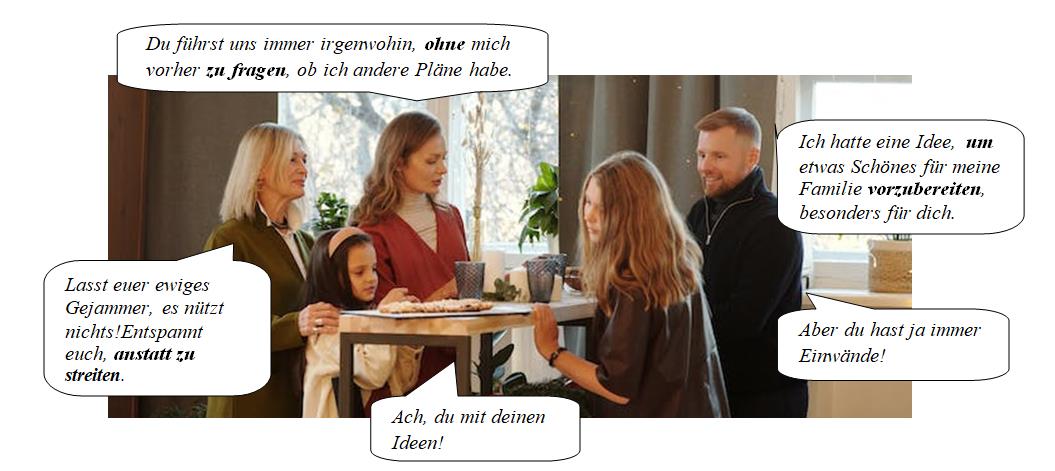An infinitive clause with zu can be introduced by four prepositions: um, (an)statt, ohne, and außer. These clauses have special meanings and are the equivalent of adverbial clauses. In this lesson, you will learn all about the infinitive constructions that start with um, anstatt, ohne + zu + infinitive, what they mean, how they are built, what types of sentences they belong to.
Thank you for reading this post, don't forget to subscribe!CONTENTS
What is the infinitive construction?
um… zu + INFINTIV
ohne… zu + INFINTIV
(an)statt … zu + INFINTIV
Order of infinitive clauses
What is the infinitive construction?
The infinitive construction is a shortened version of certain subordinate clause, that’s why we also classify it as a dependent clause.
Although infinitive constructions may not initially appeal to German language learners, they find it very difficult to shorten dependent clauses, which they already consider challenging to learn. However, over time, they become much easier to use.
Infinitive constructions are also called infinitive sentences, the Infinitivgruppe or Infinitivsatz in German. There are several types of infinitive sentences, such as:
zu + INFINITIVE
um…zu + INFINITIVE
ohne…zu + INFINITIVE
anstatt…zu + INFINITIVE
In this lesson, we will only talk about the um…zu + INFINITIVE, ohne…zu + INFINITIVE and (an)statt…zu + INFINITIVE.
The infinitive constructions um … zu, ohne … zu, and anstatt… zu can be used independently with certain verbs. They have various uses, but they all share the characteristic that the verb appears in the infinitive at the end of the sentence and they do not have a subject.
um … zu + INFINTIVE
An infinitive clause with um…zu expresses purpose, like English ‘in order to’. It is the equivalent of a clause introduced by damit. We use damit when the subject in the main and dependent sentences is different.
For example:
Er zieht nach Deutschland, damit seine Kinder bessere Schulen besuchen können.
He moves to Germany so that his children can attend better schools.
This sentence cannot be converted into an infinitive construction because the SUBJECT in the main clause is DIFFERENT from the SUBJECT in the dependent clause.
In English it is not always necessary to say ‘in order to’ in such contexts – it is sufficient to say ‘to’. In German it is normally necessary to use um…zu if the idea of purpose is involved.
If the subject in the main and dependent clause is the SAME, then we can turn the damit sentence into an infinitive sentence with um..zu.
For example:
Ich gehe zweimal pro Woche ins Schwimmbad, damit ich fit bleibe.
Ich gehe zweimal pro Woche ins Schwimmbad, um fit zu bleiben.
We dropped the conjunction damit and the subject (ich), and instead we inserted um, and we turn the finite verb into the infinitive and add zu in front. Zu + INFINITIVE necessarily comes at the end of the sentence.
Go to the lesson: Um…zu, Damit – Clause
ohne… zu + INFINTIVE
Ohne … zu corresponds to English ‘without’ followed by an ‘-ing’ form.
Sentences with ohne dass can be turned into an infinitive construction if the subject in the main and dependent clauses is the SAME.
If the subjects in both sentences are the same, ohne dass–sentence can be shortened and turned into an infinitive construction: ohne + zu + infinitive
For example:
Die alte Frau überquert die Straße, ohne dass sie auf den Verkehr achtet.- An old woman crosses the street without paying attention to the traffic.
Die alte Frau überquert die Straße, ohne auf den Verkehr zu achten.
Er fährt das Auto schon einen Monat lang, ohne dass er die Zulassung verlängert.- He has been driving the car for a month without renewing the registration.
Er fährt das Auto schon einen Monat lang, ohne die Zulassung zu verlängern.
(an)statt … zu + INFINTIVE
(An)statt… zu corresponds to English ‘instead of’ followed by an ‘-ing’ form.
Sentences with (an)statt dass can be turned into an infinitive construction if the subject in the main and dependent clauses is the SAME.
For example:
Sie nimmt immer ein Taxi, statt dass sie zu Fuß geht.
Sie nimmt immer ein Taxi, statt zu Fuss zu gehen.
– She always takes a taxi instead of walking.
Order of the infinitive clauses
| MAIN CLAUSE | DEPENDENT CLAUSE |
| Er muss sich beeilen, | um den Bus nicht zu verpassen. |
| Wir fahren in den Urlaub, | ohne ein Hotel zu buchen. |
| Er isst in einem Restaurant, | (an)statt das Mittagessen zu Hause zu machen. |
| DEPENDENT CLAUSE | MAIN CLAUSE |
| Um den Zug nicht zu verpassen, | muss er sich beeilen. |
| Ohne ein Hotel zu buchen, | fahren wir in den Urlaub. |
| (An)statt das Mittagessen zu Hause zu machen, | isst er in einem Restaurant |
See more:



